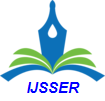Title:
EDUCATION AND INCOME DIVERSIFICATION
STRATEGIES IN KENYA |
Authors:
Anthony Wambugu
|
Volume - 2 Issue - 8, Pages - 4335-4346
|
Abstract:
Using a representative national household survey and multinomial logit regression, this study
analyses the relationship between education and household choice of economic activity
combination among four economic activities: wage work, wage work and farming, wage work
and family enterprise, and wage work, farming and family enterprise. The results reveal
pervasive combination of income generating activities among rural and urban households in
Kenya. Completion of primary education and completion of secondary education are a key
driving force encouraging income generation from multiple sources. Education attainment
beyond secondary level tends to drive households into specializing in wage work. The results
suggest that, education plays an important role in the process by which both rural and urban
households generate income and sustain livelihoods, by influencing access to different income
generating activity combinations in Kenya. There are also notable lifecycle and gender
differences in income source diversification. |
Cite this Article: [Wambugu, Anthony. "EDUCATION AND INCOME DIVERSIFICATION STRATEGIES IN KENYA." International Journal of Social Science and Economic Research, vol. 2, no. 8, 2017, pp. 4335-4346. August.] |
Download Full Text |
 International Journal of Social Science & Economic Research
International Journal of Social Science & Economic Research

